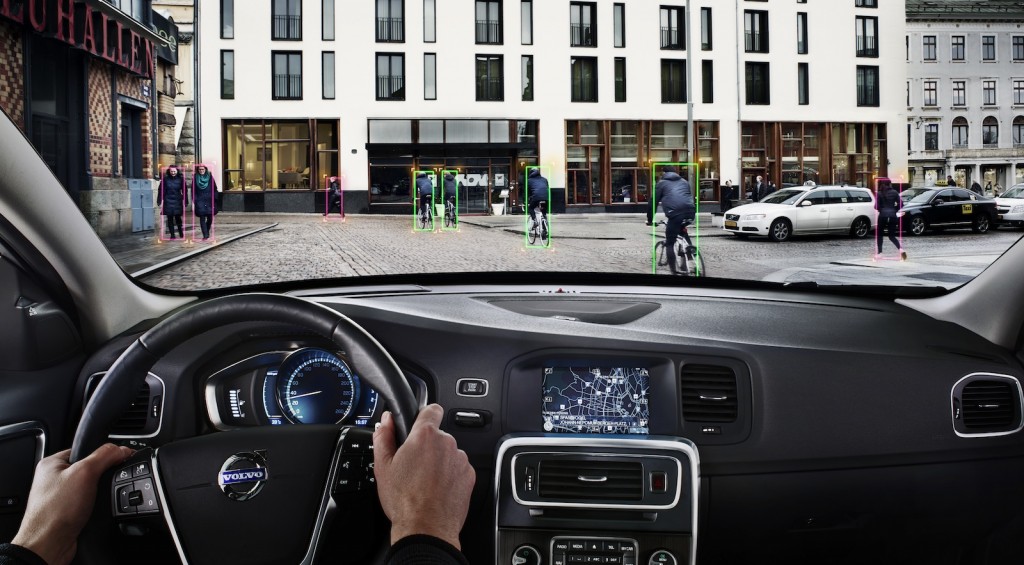According to The Outdoor Foundation, cycling is the second most popular outdoor activity in the United States, with 60 million adult Americans riding each year. While studies show that we’re biking to work more than ever, most U.S. cities have a long way to go before they can be compared to the most bike friendly of the world; cities like Copenhagen and Amsterdam.
The situation is getting better, but educating drivers can be a challenge, and without proper infrastructure everywhere, sharing the road can be less than ideal. Thanks to Swedish auto maker Volvo, the road may soon be safer for cyclists. Volvo is known for making some of the world’s safest cars, and they’re now hoping to extend that safety to all road users with a new Pedestrian and Cyclist Detection System.

This system is essentially a software upgrade to Volvo’s current Pedestrian Detection system. Thanks to more rapid vision processing, the new system has been enhanced to prevent collisions when a bike and a car are headed in the same direction:
- A sonar-like sensor system continually scans the area ahead of the car.
- A radar unit integrated in the vehicle’s grill detects objects out in front and determines their distance.
- A high- resolution camera fitted into the rear-view mirror is used to identify the object detected by the radar, and calculate it’s pattern of movement.
When the system senses that a collision is imminent, a warning is delivered to the driver. If the driver does not react quickly enough, full breaking power is applied. The automatic braking should avoid or mitigate the damage from any possible impact.
A demonstration of the system can be seen in this video released by Volvo:
I only hope technology like this won’t lull us into a false sense of security, perhaps even making drivers LESS attentive. We can’t rely entirely on computer systems, and start driving on autopilot. Drivers and cyclists alike need to be cautious and constantly aware of their surroundings. I don’t exactly like the depiction of the cyclist in this video, as seemingly clueless. It almost says, “we need this detection system because we all drive perfectly, and cyclists are always swerving into traffic creating dangerous situations.” If anything, we need this technology because drivers can be negligent and inattentive. Many don’t understand cyclists have a right to the road, or that law requires drivers to leave 3 feet when passing a cyclist. Half of them still think we belong on the sidewalk. Don’t get me wrong, there are people on bikes out there that do some stupid things, but we ALL need to take responsibility for creating a safe network of roads.
/rant
Cool technology though! Amazingly, the Pedestrian and Cyclist Detection system is going to be included in the 2014 line as standard equipment.
“One million Volvos with [the original] Auto Brake on the roads take us toward our aim that nobody should be killed or suffer serious injuries in a new Volvo car by the year 2020”, noted Thomas Broberg, Senior Safety Advisor at Volvo.
When cyclists and cars share the road it’s everyone’s responsibility to be truly aware and cautious of one another. Regardless, things sometimes happen faster than we’re able to react. This new feature can hopefully help in those situations, and hopefully we see other car manufacturers taking cyclists into consideration in the future.
Oh, and yes, that is a chicken on a Montague bike, next to a Volvo.





Great blog. I’m looking forward to the day when all cars have cyclist detections systems. Even better yet, why not separate cars and bikes by making bike specific roads that are separated from the car roads – like they have in Germany.
Great article, and really nice chicken, too.
@Rob
Cycling specific infrastructure, like separated bike paths, is no doubt the ideal situation. We should have them everywhere possible (and hopefully we soon will). Unfortunately, in many dense cities, there’s no way every route could have room for that. Narrow roads in old cities like London and Boston will probably always see cyclists and motorists sharing space, so anything we can do to make that safer is a step in the right direction.